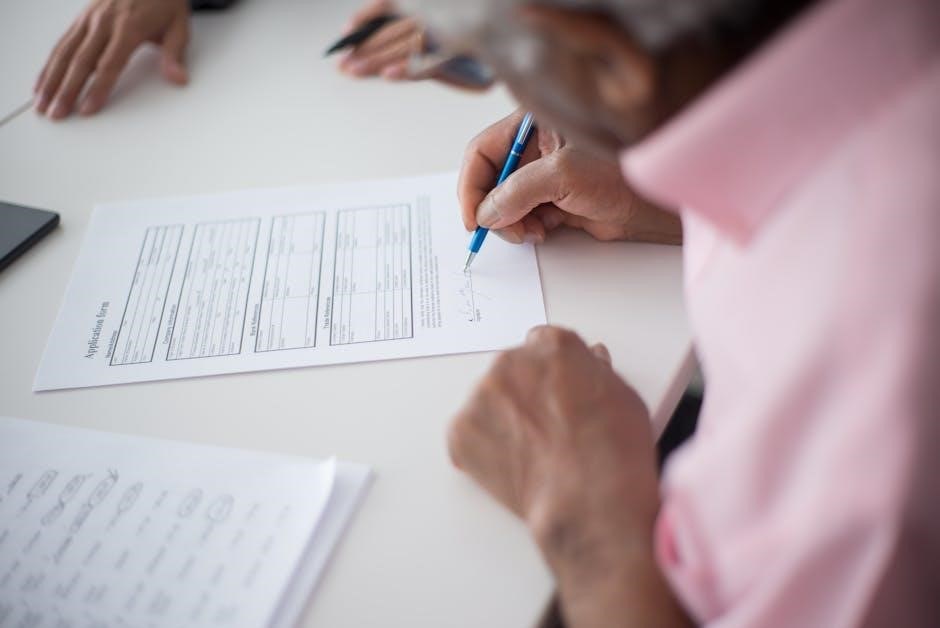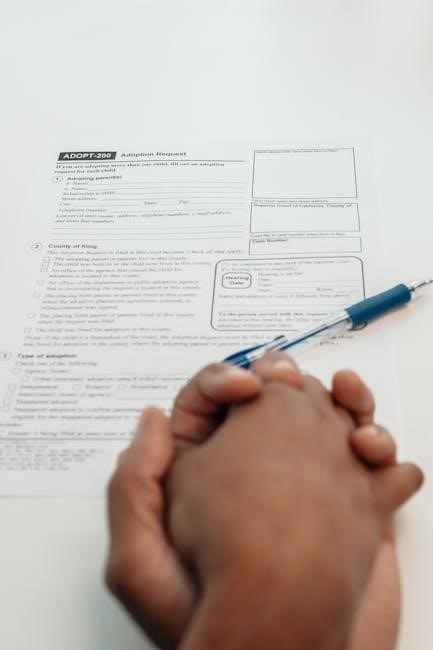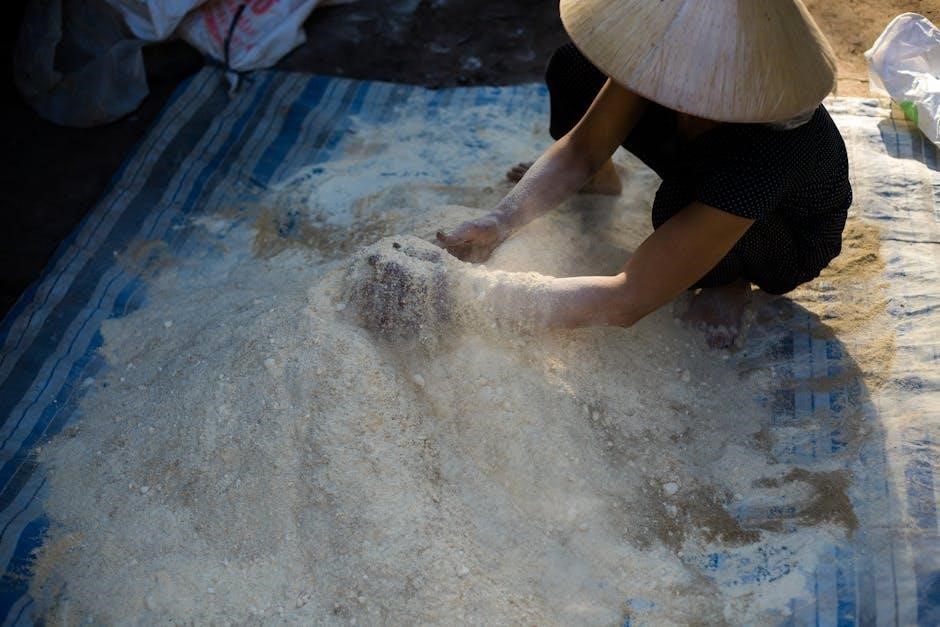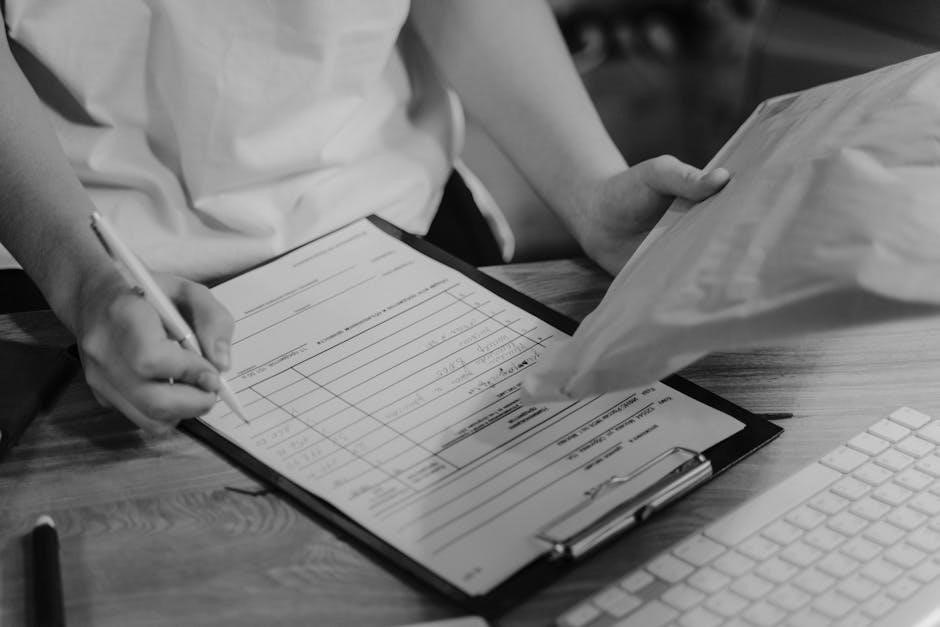A hardship license in Louisiana is a restricted permit issued by the Office of Motor Vehicles, allowing limited driving privileges for essential needs, such as work, school, or medical purposes, during a license suspension․
Definition and Purpose
A hardship license in Louisiana is a restricted driving permit issued to individuals whose licenses are suspended but require limited driving privileges for essential activities․ It is designed to allow driving for specific purposes, such as commuting to work, attending school, or addressing medical needs․ The license ensures individuals can maintain their livelihood and essential responsibilities while adhering to the terms of their suspension․ It is a temporary solution intended to balance public safety concerns with the necessity of personal mobility, offering a structured approach to regain partial driving rights under strict conditions․
Eligibility Criteria for a Hardship License
Eligibility for a Louisiana hardship license requires meeting specific conditions, such as a first DUI offense, being at least 21 years old, and demonstrating a need to drive for essential purposes like work, school, or medical appointments․
Who Qualifies for a Hardship License in Louisiana
Individuals with suspended licenses may qualify for a hardship license if they meet specific criteria․ This includes those facing a first DUI offense, being at least 21 years old, or needing to drive for essential purposes like work, school, or medical appointments․ The license is typically issued after 30 days of suspension for first offenses․ Applicants must demonstrate a genuine need for limited driving privileges to maintain livelihood or address life necessities․ However, commercial drivers (Class A, B, or C) are not eligible for a hardship license, as it is restricted to Class D or E license holders․

Application Form for Hardship License
The application form DPSMV 1887 is required to apply for a hardship license in Louisiana, provided by the Louisiana Department of Public Safety․ It requires necessary information for processing the restricted permit․
Overview of Form DPSMV 1887
Form DPSMV 1887 is the official application for a hardship license in Louisiana, issued by the Louisiana Department of Public Safety․ This form is essential for individuals seeking restricted driving privileges due to a suspended license․ It requires detailed personal information, the reason for the application, and a notarized signature․ Applicants must accurately complete all sections to ensure proper processing․ The form is available for download from the OMV website or can be obtained in person at a local field office․ Its completion is a critical step in the hardship license application process, ensuring compliance with state regulations․
For more information, visit the Louisiana OMV website․

Documents Required for Application
To apply for a hardship license in Louisiana, you must submit the completed Form DPSMV 1887, proof of employment, school enrollment, medical documentation, and a copy of your suspended driver’s license․
Essential Documentation Needed
Applicants must provide a completed Form DPSMV 1887, proof of employment, school enrollment verification, medical documentation, and a copy of their suspended driver’s license․ Additional requirements include a reinstatement fee, ranging from $60 to $300, and potentially court-ordered documentation, depending on the suspension reason․ These documents verify the necessity for limited driving privileges, ensuring compliance with Louisiana’s hardship license regulations․ Proper submission of all required paperwork is crucial for a successful application․
Step-by-Step Application Process
Submit a completed Form DPSMV 1887, along with required documents and fees, to the Louisiana OMV or court․ Follow specific guidelines for processing and approval․
How to Apply for a Hardship License
To apply for a hardship license in Louisiana, complete Form DPSMV 1887 and submit it to the Office of Motor Vehicles or court․ Ensure all required documents, such as proof of employment, school enrollment, or medical necessity, are included․ Pay the reinstatement fee, which ranges from $60 to $300, depending on the suspension reason․ Some cases may require a hearing․ Once approved, the license allows driving for essential purposes like work, school, or medical appointments․ Restrictions, such as an ignition interlock device, may apply․ Processing times vary, so check with OMV for updates;
Differences Between OMV and Court Applications
Applying for a hardship license in Louisiana can be done through the Office of Motor Vehicles (OMV) or the court, depending on the situation․ OMV applications are typically faster and used for administrative suspensions, requiring Form DPSMV 1887 and supporting documents․ Court applications are necessary for certain offenses, such as DUI, and involve filing a petition with additional legal steps․ The OMV process is more straightforward, while court applications may require a hearing and judicial approval․ Both pathways aim to restore limited driving privileges but differ in complexity and requirements based on the reason for suspension․
Costs and Fees Associated
Obtaining a hardship license in Louisiana involves statutory fees, including a reinstatement fee ranging from $60 to $300, a $15 delinquent fee, and a $100 issuance cost․
Financial Requirements for Obtaining a Hardship License
To obtain a hardship license in Louisiana, applicants must pay a reinstatement fee, which varies from $60 to $300 depending on the suspension reason; Additionally, a $100 issuance cost and a $15 delinquent fee are required․ These fees must be paid before the application is processed․ In some cases, an ignition interlock device may be mandatory, adding further costs․ The total financial burden ensures compliance with state regulations while allowing limited driving privileges for essential purposes like work, school, or medical needs․

Restrictions on a Hardship License
A hardship license in Louisiana restricts driving to essential activities like work, school, or medical needs․ It cannot be used for commercial purposes and may require an ignition interlock device․
Limitations and Conditions
A Louisiana hardship license restricts driving to essential purposes like work, school, or medical appointments․ It cannot be used for non-essential activities or commercial driving․ Drivers must comply with specific conditions, such as installing an ignition interlock device if required, especially for DUI-related suspensions․ The license is only valid for Class D or E licenses, excluding commercial licenses․ Additionally, applicants must be at least 21 years old for certain offenses, and the license is typically issued for a limited period․ Violating these conditions can lead to further suspension or penalties, emphasizing the importance of adhering to the terms set by the Office of Motor Vehicles․

Processing Time and Issuance
The processing time for a Louisiana hardship license varies by case, but applicants typically receive it within 30 days․ If not received within this period, they must visit a field office within 60 days to remain eligible․
How Long Does It Take to Receive the License
The processing time for a Louisiana hardship license typically ranges from 7 to 30 business days after the application is submitted․ If the license is not received within 30 days, applicants must visit a field office within 60 days of submission to remain eligible․ Delays may occur due to incomplete applications or additional documentation requirements․ The Office of Motor Vehicles (OMV) prioritizes complete and accurate submissions, ensuring faster processing․ Applicants are encouraged to contact the OMV at (225) 925-6146 if they experience delays or issues with their application․
Denial and Appeal Options
If your hardship license application is denied, you may appeal the decision within 30 days․ A written request for a hearing must be submitted to the Louisiana OMV or court, detailing reasons for reconsideration․ Legal representation is recommended to strengthen your case and ensure compliance with state regulations․
What to Do If Your Application Is Denied
If your hardship license application is denied, you can request a hearing within 30 days․ Submit a written appeal to the Louisiana OMV or court, detailing reasons for reconsideration․ Include any additional evidence supporting your need for driving privileges․ Legal representation is recommended to strengthen your case․ The hearing will review your eligibility and circumstances․ If denied again, you may need to wait until your suspension period ends to apply again․ Understanding the denial reasons and addressing them can improve future application outcomes․
A Louisiana hardship license offers a solution for individuals facing license suspension, enabling essential driving privileges․ Adhering to requirements and understanding the process can help restore mobility effectively through the OMV․
Final Thoughts on Obtaining a Hardship License in Louisiana
Obtaining a hardship license in Louisiana is a viable option for individuals facing license suspension, offering limited driving privileges for essential activities like work, school, or medical needs․ Properly completing Form DPSMV 1887 and submitting required documents is crucial․ Understanding eligibility criteria and adhering to restrictions ensures compliance․ While the process may seem complex, meeting all requirements and seeking assistance when needed can streamline the application․ This license provides a lifeline for maintaining daily routines, making it a valuable option for those eligible․
